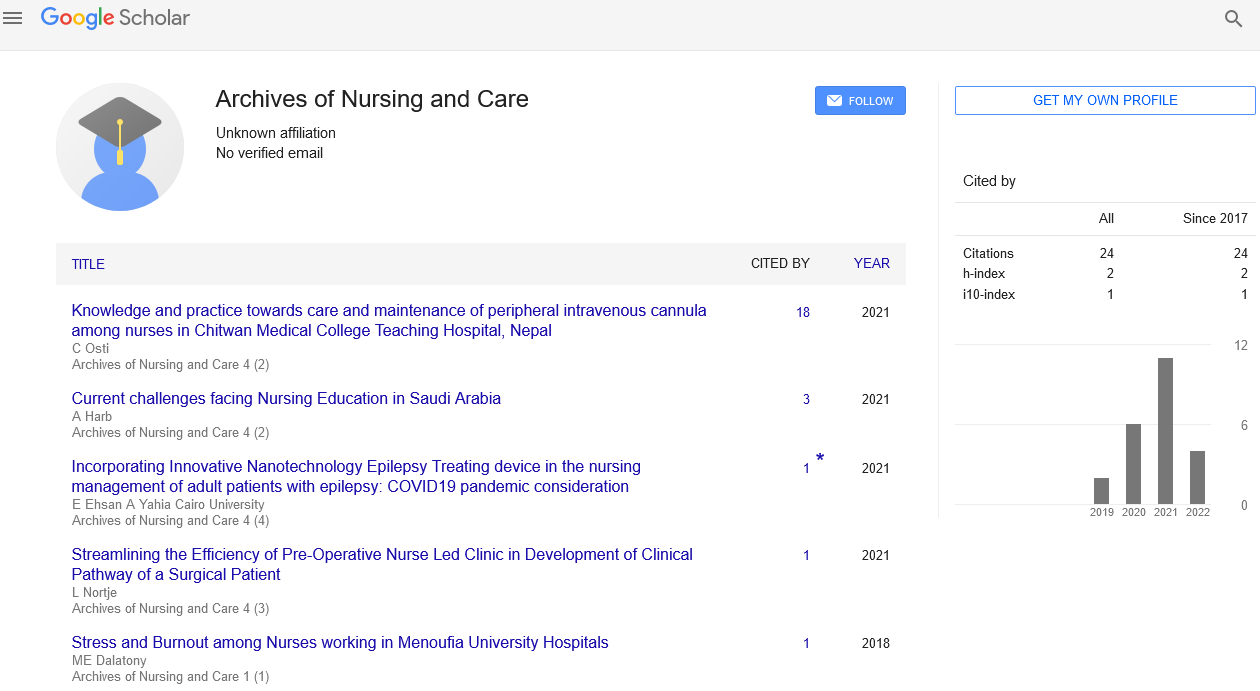Case Report - Archives of Nursing and Care (2022) Volume 5, Issue 8
Nurses Conceptions of Religion and Divine Care in Various Dutch environments of health care
JamesCarol*
Knowledge Centre Spirituality and Health Care, Christian University of Applied Sciences Via, PO Box 10030, 8000 GA Zwolle, Netherlands
Knowledge Centre Spirituality and Health Care, Christian University of Applied Sciences Via, PO Box 10030, 8000 GA Zwolle, Netherlands
E-mail: Jamescarol@viaa.nl
Received: 03- October- 2022, Manuscript No. oanc-22-78378; Editor assigned: 05- October -2022, PreQC No. oanc-22-78378 (PQ); Reviewed: 19- October -2022, QC No. oanc-22-78378; Revised: 24- October -2022, Manuscript No. oanc-22-78378 (R); Published: 28- October -2022 DOI: 10.37532/oanc.5 (8).92-94
Abstract
This paper shows likenesses and contrasts in discernments and capabilities with respect to otherworldliness and profound consideration of attendants in various medical care settings. Research on this particular theme is restricted and can contribute towards a nuanced execution of otherworldly consideration in various nursing care settings. 400 49 medical caretakers in various medical services settings finished a poll concerning otherworldliness and profound consideration, otherworldly consideration capability, and individual otherworldliness. Respondents detailed a nonexclusive (rather than more unambiguous) perspective on otherworldliness and profound consideration, and they saw themselves to be able in giving otherworldly consideration. Contrasted with attendants in clinic settings, medical caretakers in psychological well-being care and home consideration have a more nonexclusive perspective on otherworldliness and profound consideration and report a more significant level of capability.
Keywords
Otherworldliness • Profound consideration• nursing• Emergency clinic care• Psychological well-being care• Home consideration
Introduction
Studies give a developing understanding in what otherworldliness implies inside the setting of medical services overall and all the more explicitly, in nursing. Other than the "definition issue", the importance of otherworldliness and profound consideration for nursing becomes more clear practically speaking related research. Audits showed that nature of otherworldly consideration is connected with explicit patients' necessities and to the improvement of attendants' capability, and the job of training. Close to this, they see themselves more as otherworldly people [1]. Future exploration is expected to foster further comprehension in setting explicit elements and their effect on medical attendants' perspectives and capability in regards to profound consideration. Nursing instruction and the executives ought to consider an accentuation on profound ability improvement connected with working settings of medical caretakers [2]. Writing shows a positive relationship between the medical attendants' impression of the significance of otherworldliness and profound consideration. Dutch attendants (n = 372) say that otherworldly consideration is applicable in nursing, but at the same time know that it is still distant from typical in the present nursing practice. Attendants state they need more skill and reasonable rules to incorporate profound consideration. An extraordinary greater part of the respondents in this study (90%) concurred with a practical portrayal of the idea of otherworldliness, related with the idea's significance and reason, perspective on life, and inquiries of life [3]. The review showed that age and profound/strict association appear to be indicators for the way and degree to which attendants give otherworldly consideration. This was additionally perceived in the overview by McSherry and Jamieson, who expressed that the rising secularization of society and medical care seems to cause uneasiness among certain attendants and vulnerability concerning individual convictions and expert practice. They express that otherworldliness and profound consideration can possibly change authoritative societies, values, and perspectives. Writing underlines the significance of the job of administration and the executives concerning the execution of otherworldly consideration. The previously mentioned overviews additionally asked respondents for work title and claim to fame (area of medical services in which one is working). The examinations show no inside and out investigations with respect to these factors. It isn't evident whether these factors are indicators for attendants' perspectives towards otherworldliness and profound consideration [4]. A study among staff attendants in Turkey showed that medical attendants in paediatric and mental division’s revealed higher aversion to otherworldliness and profound consideration contrasted with different offices. Ruder, who explored the attendants' impression of profound consideration, underlines expressly that her review didn't address the connection between the area of medical services where the medical attendant worked and the otherworldliness. By expressing this, she proposes that this relationship may be critical. The inquiry emerges whether similitudes and contrasts in view of attendants in regards to otherworldliness and profound consideration exist between various medical services settings. A response to this question would be a commitment toward a nuanced execution of otherworldly consideration in comprehensive expert nursing care and the job of nursing authority in such cycles [5].
Discussion
The specialists visited the units for a couple of days, and medical caretakers present were approached to take part. The absolute example size of the attendants in the twenty units of the six clinics came to 340, and the complete example size of the medical attendants in the three establishments in psychological wellness care was 260 [6]. Furthermore, an irregular example of 600 attendants in home consideration was sent an email with the solicitation to partake in the study. To select the example, endorsement was gotten from the leading body of the staff of the college, and from the leading group of the taking part emergency clinic units, emotional well-being associations, and home consideration settings. These establishments didn't have standing moral audit boards of trustees [7]. After endorsement from all care chiefs, the point and content of the review was made sense of for the attendants in clinics and emotional well-being care around a shift or during an espresso or mid-day break, and to the medical attendants in home consideration by email. All members additionally got composed data about the review and the privileges of the members: interest was intentional and mysterious, and respondents held the option to pull out from the overview with next to no limitations. Subsequently, information examined was anonymous [8]. Data were gathered by poll. Medical caretakers were approached eye to eye (emergency clinic and emotional wellness care) or by email (home consideration) to finish a self-controlled poll. At the point when medical caretakers consented to take part, medical attendants in clinics and emotional wellness care got the survey as printed copy. Prior to finishing the polls, attendants got data about the review's point. During the espresso or mid-day break attendants could finish up and deliver the poll [9]. Medical attendants in home consideration were tended to by email and could finish up the poll online over a time of about a month. Following two weeks, an update was send. Surveys expected around 15 minutes to finish. The survey comprised of four sections: (1) segment qualities, (2) view of otherworldliness and profound consideration, (3) self-appraisal of profound consideration skill, and (4) assessment of one's very own otherworldliness. Information were gathered and broke down between late 2012 and mid- 2014. The solutions to the survey were placed into IBM SPSS Measurements adaptation 20 for expressive examination. Recurrence and level of segment qualities, and outline scores (mean and standard deviation (SD)) were determined for the 3 normalized measures (SSCRS, SCCS and SAIL). This incorporated the subscales of these pieces of the poll. Rundown scores will be looked at among areas and segment qualities. All examinations were made expecting a p-worth of 0.05. Moreover, relationships between the rundown scores were calculated. Compared to results from research that isn't area explicit, the normal outline scores compare with the scores of nursing understudies as to the SSCRS. Furthermore, are marginally higher than scores of the SSCRS of graduated medical attendants in different nations [10]. As to the SCCS and SAIL, the scores are somewhat higher than those in nursing understudies in the Netherlands, yet by and large; contrasts in the scores are little.
Conclusion
Medical attendants overall appear to have a conventional view of otherworldliness and profound consideration skill level. Age and life view is by all accounts related with contrasts in impression of, and disposition towards, otherworldliness and profound consideration skill, which affirms other research. Research in regards to working spot related factors is, apparently, still restricted. Biro, for instance, expresses that nurture supervisors can advocate for hierarchical change to make profound consideration a piece of standard practice. Other than the instructive part of profound consideration, more exploration is required as to these authoritative perspectives. Reimer-Kirkham et al. accentuate the significance of administration for combination of otherworldliness and profound consideration in the work environment. They express that this authority ought to be created and that nurture chiefs are situated to work with this cycle in their association. Our review shows that in this cycle, working environment qualities ought to be thought of. Along these lines, nursing work on, nursing instruction, and nursing the board ought to consider an accentuation on profound capability advancement connected with working settings of medical caretakers.
Acknowledgement
None
Conflict of interest
Author declares no conflict of interest
References
- Patrick DM, Marra F, Hutchinson J et al. Per capita antibiotic consumption: How does a North American jurisdiction compare with Europe? Clin Infect. Dis. 39, 11-17 (2004).
- Li WC. Occurrence, sources, and fate of pharmaceuticals in aquatic environment and soil. Environ Pollute. 187, 193-201 (2014).
- Heberer T. Occurrence, fate, and removal of pharmaceutical residues in the aquatic environment: A review of recent research data. Toxicol Lett. 131, 5-17 (2002).
- Banci L, Ciofi-Baffoni S, Tien M Lignin et al. Peroxidase-catalyzed oxidation of phenolic lignin oligomers. Biochemistry. 38, 3205-3210 (1999).
- Deblonde T, Cossu-Leguille C, Hartemann P et al. Emerging pollutants in wastewater: A review of the literature. Int J Hyg Environ Heal. 214, 442-448 (2011).
- Tavakoli M, Emadi Z. The Relationship between Health-Promoting Lifestyle, Mental Health, Coping Styles and Religious Orientation among Isfahan University Students. J Res Behave Sci . 13, 64-78(2015).
- Norouzinia R, Aghabarari M, Kohan M et al. Health promotion behaviors and its correlation with anxiety and some students’demographic factors of Alborz University of Medical Sciences. Journal of Health Promotion Management. 2,39-49(2013).
- Pierce C. Health promoting behaviors of rural women with heart failure. Online Journal of Rural Nursing and Health Care. 5, 28-37(2005).
- Hajizadeh Sharafabad F, Alizadeh M. Predictors of health-promoting behaviors in patients with coronary artery disease in the Iranian population. International Journal of Nursing Practice. 11, 164-176(2016).
- Shahbaz A, Hemmati Maslakpak M. Relationship of self-care behaviors with hospital readmission in people with heart failure. Cardiovascular Nursing Journal. 6, 24-33(2017).
Indexed at, Google Scholar, Crossref
Indexed at, Google Scholar, Crossref
Indexed at, Google Scholar, Crossref
Indexed at, Google Scholar, Crossref
Indexed at, Google Scholar, Crossref
Indexed at, Google Scholar, Crossref
Indexed at, Google Scholar, Crossref

